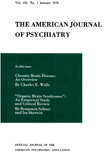Psychiatric components of medical and surgical practice: a survey of general hospital physicians
Abstract
A questionnaire was sent to 206 internists and surgeons asking them to estimate the following: the frequency of psychiatric disorders and behavioral problems among their patients, the type and frequency of psychiatric medication they prescribed, the psychiatric consultation services they most valued, and the type of psychiatric problems they considered emergencies. These physicians estimated that 14% of their patients had significant psychiatric problems; the most frequently mentioned was depression. More than 25% of the physicians prescribed minor tranquilizers, sedatives, and antidepressants at least once a week. Violent behavior was considered a psychiatric emergency by the majority of physicians. There were significant differences between the responses of internists and those of surgeons.
Access content
To read the fulltext, please use one of the options below to sign in or purchase access.- Personal login
- Institutional Login
- Sign in via OpenAthens
- Register for access
-
Please login/register if you wish to pair your device and check access availability.
Not a subscriber?
PsychiatryOnline subscription options offer access to the DSM-5 library, books, journals, CME, and patient resources. This all-in-one virtual library provides psychiatrists and mental health professionals with key resources for diagnosis, treatment, research, and professional development.
Need more help? PsychiatryOnline Customer Service may be reached by emailing [email protected] or by calling 800-368-5777 (in the U.S.) or 703-907-7322 (outside the U.S.).



